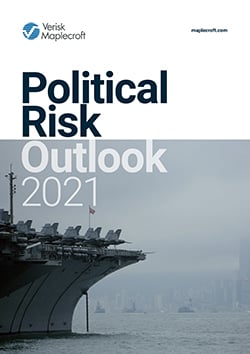This insight is part of our Political Risk Outlook 2021, which explores five key themes we’re tracking for our clients this year. You can find the other themes at our #PRO21 hub, as well as related webinars.
If China has a soft underbelly, it is its high dependency on foreign natural resources. Plugging this gap through the diversification of its hydrocarbon and mineral supply chains has become a strategic priority for Beijing alongside its drive for self-reliance. Since China is shifting the geopolitical sands to ensure this happens, the implications are far reaching – not only for its major suppliers of strategic commodities, but also for the extractive companies deeply invested in them.
Our data shows China is pivoting towards more autocratic regimes that represent greater stability for its supply lines than democracies that are, or may become, hostile to Beijing. But it is also using its massive market as a source of diplomatic leverage. By securing diversified sources, China will be in a better position to weaponise trade with geopolitical rivals, while at the same time increasing the economic dependence of new and existing partners.
China takes multipronged approach to import diversification
China’s import structure of key resources is highly concentrated with a small group of trade partners (see Figure 1), and Australia is the chief outlier among them. It is a close US ally, yet still a major supplier of strategic resources, including met coal, iron ore and LNG. Given their deteriorating bilateral relations and China’s imports restriction on Australian coal in recent years, we believe Beijing has identified its dependence on Australian resources as one of the areas most in need of diversification.
How China diversifies its imports and achieves its other resource security priorities will come down to four strategies.
1. Diversification of suppliers:
Other than having a cordial relationship with China, political stability and regime type are the top two noncommercial factors that Beijing will always take into consideration when diversifying its supplies. Figure 2 shows that most of China’s key resource suppliers are politically stable, as reflected in their medium or low risk designations in our Government Stability Index in 2021-Q1.
Beijing prefers suppliers from stable autocratic regimes over democracies that involve frequent changes of governments and potential shifts in policy. Autocracy is a governance system it is comfortable operating with and can influence. As shown in Figure 2, Beijing can exercise this preference when it comes to oil and gas imports because many of the largest hydrocarbon producers, such as Saudia Arabia and Russia, are autocracies or illiberal democracies.
2. Diversification of investment:
China is seeking to strengthen its control over global supply chains via overseas investments and partnerships with international majors. Beijing has been supporting Chinese SOEs to ‘go global’ and establish control of resource bases overseas since the late 1990s. For example, Figure 3 shows that the number of Chinese-owned base metals and gold companies in Oceania has grown from zero in 2000 to 59 in 2020. This approach intends to increase the proportion of Chinese-owned resources in China’s total imports.
3. Diversification of transit routes:
Geopolitical instability in the Middle East and the South China Sea has induced China over the past decade to diversify its seaborne imports with overland imports, as reflected by its massive investment in energy pipelines with Russia and Central Asia. The Myanmar-China oil and gas pipelines are another example of China’s attempt to reduce its reliance on a sea lane that transits through strategic chokepoints, in particular the Strait of Malacca.
4. Diversification of resources:
For commodities with no immediate alternative supplier, Beijing is actively seeking substitution strategies. One method is increasing imports of scrap steel to use as a feedstock, as a way to reduce reliance on imported Australian iron ore.
Learn more about our Mining & Metals Solutions
Greater resource security brings greater geopolitical leverage
By diversifying its natural resource suppliers, China is increasingly reducing a key vulnerability and strengthening its geopolitical levers. Beijing sees three areas in particular that shift the balance in its favour.
Beijing will use trade as a coercive weapon:
Through measures such as import restrictions, China will be in a better position to use its massive market as diplomatic leverage in great power competition. Resource companies based in countries with frosty diplomatic relations with Beijing are most likely to be on the receiving end of economic coercion. This diplomatic tool is most effective when wielded against commodities in which China has a diversified import profile and the target state is dependent on the Chinese market.
Closer China-Russia ties will act as a counterbalance to the West:
Despite a history of mutual distrust, Russia and China’s economic and political interests have converged over the past decade. Deteriorating relationships with the West have driven the two countries to cooperate closer in multiple areas, in particular energy. Increasing energy imports from Russia will further both Beijing’s import diversification strategy and Moscow’s ’Pivot to Asia’.
China-backed multilateral initiatives will favour Belt and Road partners:
Beijing’s diversification strategy will increase Chinese investment in and trade with selected countries, mostly its Belt and Road Initiative partners, which will in turn increase their economic reliance on China. Financing terms, such as interest rate discounts and lower ESG requirements, are more attractive to countries that are prioritising a quick economic recovery over a ‘green recovery’ from Covid-19. These partnerships will reshape multilateralism with an economic order that is more China-centric.
Companies and investors are in the direct sights of Beijing’s diplomatic moves...
Companies and investors in the firing line
Geopolitical tensions are not set to decrease any time soon, so China is speeding up its efforts to reduce resource reliance on unfriendly suppliers. Banning imports of coal from Australia was a prime example but more are likely to follow, with significant impacts on the trade in global commodities and the geopolitical landscape likely. Companies and investors are in the direct sights of Beijing’s diplomatic moves and will need to prepare accordingly.



